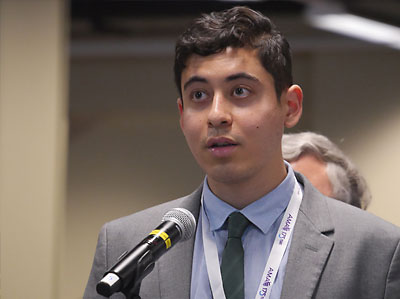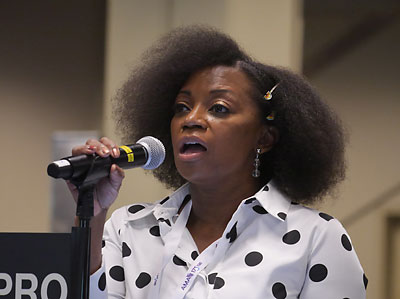AMA House Approves Publicity for 988 Awareness, Other Mental Health Measures
Abstract
Mental illness and the mental health crisis were prominent issues at this year’s meeting of the House of Delegates. The meeting was the first in-person gathering of the policymaking House of Delegates since 2019.
The AMA will work to educate physicians and the public about the new 988 National Suicide Prevention Lifeline program and will work with specialties, state medical societies, relevant state and federal agencies, and other stakeholders to advocate for adequate federal and state funding for the new system.
The AMA’s House of Delegates voted overwhelmingly to support the resolution sponsored by the Section Council on Psychiatry, which represents APA, the American Academy of Psychiatry and the Law, the American Academy of Child and Adolescent Psychiatry, and the American Association for Geriatric Psychiatry. The vote took place at the annual policymaking meeting of the AMA House of Delegates in Chicago in June.

“Polls have found that less than 15% of the general public is aware of 988, and more concerningly, the majority of health care professionals are also not aware of 988,” said psychiatrist Eric Rafla-Yuan, M.D.
The AMA’s House of Delegates voted overwhelmingly to support the resolution sponsored by the Section Council on Psychiatry, which represents APA, the American Academy of Psychiatry and the Law, the American Academy of Child and Adolescent Psychiatry, and the American Association for Geriatric Psychiatry. The vote took place at the annual policymaking meeting of the AMA House of Delegates in Chicago in June.
In 2020, the Federal Communications Commission (FCC) designated 988 as the new, three-digit dialing code to be used for all mental health, suicide, and other psychiatric crises. The FCC ordered all telecommunications companies to make the necessary changes so that all calls to 988 are routed to the National Suicide Prevention Lifeline, which went into effect July 16.
But psychiatrist Eric Rafla-Yuan, M.D., speaking for the section council, told AMA delegates that many jurisdictions are unprepared for the switch to the new number and that many people—including physicians—are unaware of the change.
“Importantly, 988 is envisioned as the first component of the crisis continuum of care, which includes someone to call, someone to come, and somewhere to go, all without overreliance on police,” he said. “This is excellent progress, but thus far polls have found that less than 15% of the general public is aware of 988, and more concerningly, the majority of health care professionals are also not aware of 988.
“It is imperative that physicians and patients are aware of these lifesaving services,” Rafla-Yuan said. “Additionally, AMA awareness campaigns should also encourage sustainable funding to ensure reliable and timely access to 988 and crisis services.”
He is a voluntary assistant clinical professor in the Department of Psychiatry at the University of California, San Diego, and is the 2021 APA Jeanne Spurlock Congressional Fellow. Rafla-Yuan is also a member of the APA Council on Advocacy and Government Relations.
AMA delegates also approved another resolution sponsored by the Section Council on Psychiatry directing the AMA to work with appropriate stakeholders to make evidence-based recommendations regarding the presence of weapons in correctional health care facilities.

“Policies requiring physicians to carry and use non-lethal weapons may irrevocably harm the physician-patient therapeutic alliance,” said Dionne Hart, M.D.
Speaking for the section council, Dionne Hart, M.D., explained that all Bureau of Prison correctional staff are required to complete up to three weeks of training at a federal law enforcement training center to become certified in the use of firearms. However, physicians, clergy, and members of the Public Health Service have been exempt from the training.
“In recent years, new policies have required all correctional staff including physicians to carry less lethal weapons such as pepper spray and most recently rapid rotation batons,” she said. “Physicians have not been permitted to opt out of carrying these weapons, yet these less lethal weapons can result in serious injury, disability, and death.”
Hart is the AMA liaison to the National Commission on Correctional Health Care. She is a member of APA’s Council on Advocacy and Government Relations and an Assembly representative for the Minnesota Psychiatric Society. She is also an adjunct assistant professor of psychiatry at the Mayo Clinic College of Medicine and Science.
“Correctional facilities are the largest providers of mental health care in the U.S.,” Hart said. “Physicians working in correctional settings already have well-known barriers to establishing therapeutic relationships with patients in custody because of stigma regarding the credentials of physicians practicing in these settings and the dual roles that federally employed physicians have as both a member of law enforcement and a treating physician. Policies requiring physicians to carry and use nonlethal weapons may irrevocably harm the physician-patient therapeutic alliance, increase the level of agitation on a unit, and worsen health disparities in this population.”
Mental illness and the mental health crisis were prominent at this year’s meeting of the House. Delegates approved another resolution calling on the AMA to work with APA and other organizations to support educational programs to teach high school and university staff how to recognize the prodromal symptoms of schizophrenia.
“About 3 out of every 100 Americans will experience psychosis in their lifetimes, usually beginning in adolescence or young adulthood,” said section council representative Laura Halpin, M.D., Ph.D. “There are effective evidence-based treatment options, such as Coordinated Specialty Care, that improve outcomes and help individuals experiencing psychosis succeed in school and beyond. The Coordinated Specialty Care model recognizes the value of early identification and intervention and the important role schools and educators themselves play in identifying students who may be experiencing psychosis” (see Psychiatric News, “Special Report: What Is ‘Coordinated Specialty Care,’ and Why Is It Effective?”). ■



